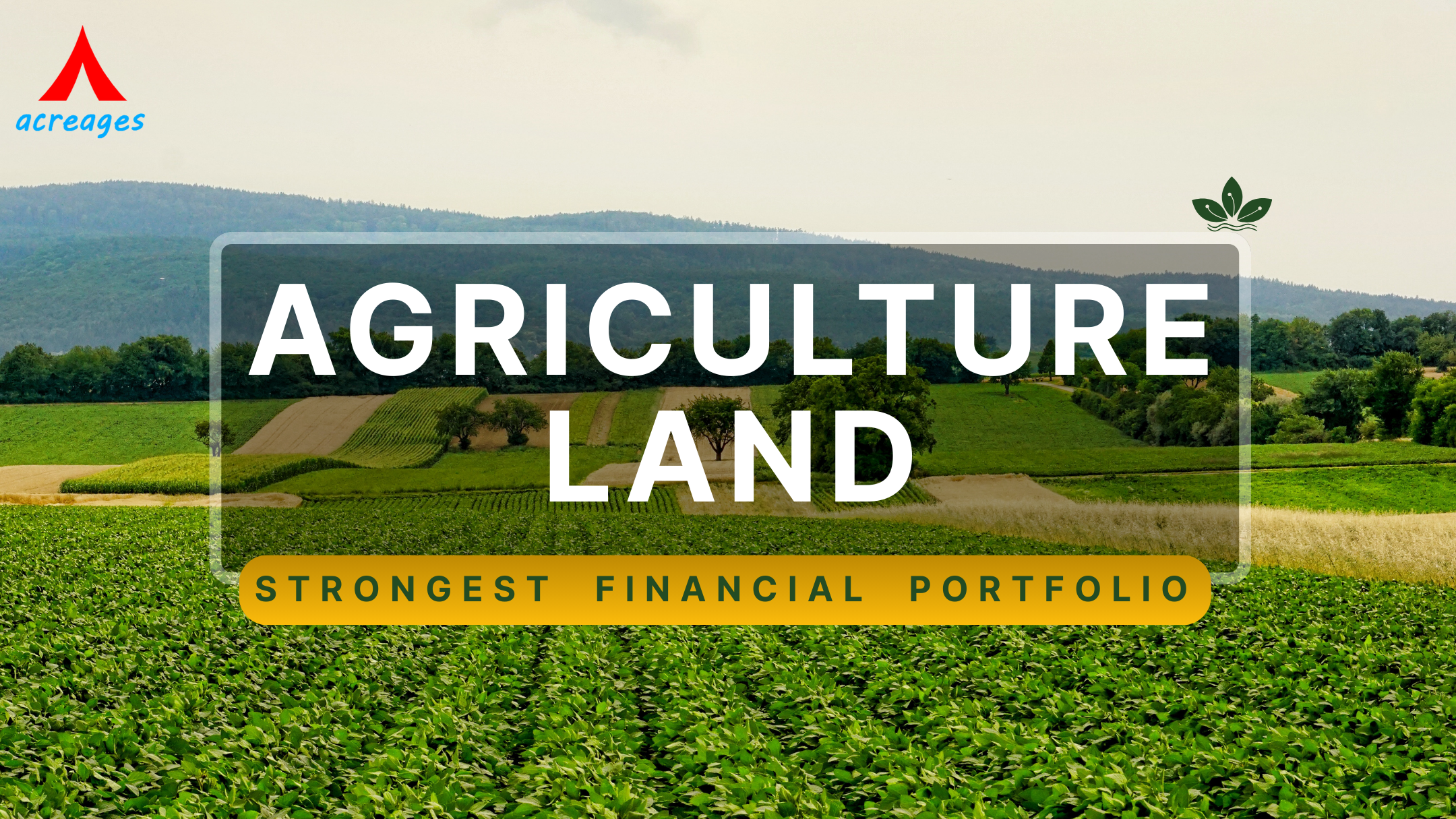🌿 Introduction: Why Agricultural Land Matters in Your Wealth Journey
In a world of fast-paced financial trends, where the buzzwords are stocks, crypto, gold, and NFTs, one timeless asset quietly stands tall—agricultural land. It may not make daily headlines, but agricultural land has been a pillar of wealth creation for centuries, and it continues to be one of the most underrated yet powerful components of a strong financial portfolio.
Imagine holding an asset that not only provides steady income, capital appreciation, and tax benefits, but also offers tangible, emotional, and generational value. That’s what agricultural land does.
In this blog, we’ll go deep—really deep—into 10 compelling reasons why agricultural land is a must-have in your financial portfolio. Let’s explore how this asset can transform your wealth strategy, help you build resilience, and create a lasting legacy.
🌾 1️⃣ Land is a Finite, Non-Reproducible Resource – The Law of Scarcity
Let’s start with the basics. The Earth’s surface is limited. While we can print more money, create more stocks, or even mint more crypto tokens, we can’t create more land. Agricultural land, in particular, is finite and irreplaceable.
Here’s the kicker: Global population is rising, but the amount of arable land is shrinking due to urbanization, climate change, and industrialization. This simple principle—finite supply + growing demand = increasing value—is the foundation of why land is a bulletproof investment.
Every patch of fertile land becomes more valuable over time because it’s essential for the most basic human need: food. And no matter how advanced technology becomes, we’ll always need food.
🌾 2️⃣ Hedge Against Inflation: Land Preserves Your Wealth
Inflation erodes the value of money, but land acts as a natural hedge.
Think about it: When the cost of goods and services increases, the price of agricultural commodities like wheat, rice, and vegetables also rises. This means that the value of farmland increases alongside inflation, ensuring your investment retains its real value over time.
Unlike cash sitting idle in a savings account or bonds tied to interest rates, agricultural land grows in value as the economy evolves. It’s a wealth-preservation tool that shields you from the silent tax of inflation.
For instance, over the last 30 years in India, agricultural land prices have multiplied several times, while inflation averaged around 6-7% annually. Landowners not only preserved their purchasing power but also grew their wealth substantially.
🌾 3️⃣ Consistent Passive Income: Make Your Land Work for You
Agricultural land is not just a long-term bet—it’s a source of steady, recurring income.
Here are some practical ways to generate income from your land:
- Lease to farmers: Earn a fixed rent annually.
- Contract farming: Partner with companies to grow specific crops, like medicinal herbs, fruits, or organic produce.
- Agroforestry: Plant trees like teak, sandalwood, or bamboo for long-term high-value returns.
- Seasonal crops: If managed well, farmland can yield 2-3 crops per year, creating multiple revenue streams.
With a thoughtful strategy, your agricultural land can become a self-sustaining cash flow machine, giving you passive income without daily market volatility.
🌾 4️⃣ Portfolio Diversification: Reduce Risk, Enhance Stability
A strong financial portfolio isn’t built on one asset class. Just like a balanced diet is essential for health, a mix of asset types is key for financial health.
Agricultural land offers low correlation with traditional financial markets.
✅ When the stock market crashes, land values often hold steady.
✅ When gold prices dip, land can remain resilient.
✅ Even during economic downturns, people need food—agriculture remains an essential sector.
This diversification effect helps you manage risk more effectively and smoothens the highs and lows of your portfolio’s performance.
🌾 5️⃣ Long-Term Capital Appreciation: Wealth That Grows Over Generations
Agricultural land is a long-term asset, but it has historically delivered impressive capital gains.
Let’s consider real examples:
- Land in Murbad, Maharashtra, priced at ₹5000 – 10,000 per acre in the early 2000s, is now valued at ₹8-10 lakh per acre.
- In many semi-urban and peri-urban areas, land values have appreciated by 500-1000% over 15-20 years.
This steady, compounding growth means that your wealth grows silently in the background—without the daily stress of market watching.
🌾 6️⃣ Tax Efficiency: Maximize Returns, Minimize Liabilities
Agricultural land offers unique tax benefits. In India, for example:
✅ Agricultural income is tax-free under Section 10(1) of the Income Tax Act.
✅ You may qualify for subsidies, grants, and incentives for organic farming, agroforestry, or sustainable practices.
✅ Landowners can also benefit from capital gains exemptions under certain conditions.
This tax efficiency makes agricultural land a strategic wealth vehicle, allowing you to retain more of your earnings.
🌾 7️⃣ Sustainable, Ethical, and Impactful Investments
Investing in farmland is not just about money—it’s about making a difference.
By owning agricultural land, you can:
🌱 Promote sustainable farming and reduce chemical usage.
🌳 Contribute to carbon sequestration through agroforestry.
👩🌾 Support local farmers by providing access to land or fair lease terms.
🍎 Enable the production of healthy, organic food for communities.
Your investment becomes a force for good, combining profit with purpose.
🌾 8️⃣ Development Potential: Future-Ready Asset
Agricultural land often has hidden value—it can be a future goldmine.
With strategic location and visionary planning, your land could:
🏡 Be converted into farmhouses, weekend homes, or eco-resorts.
🌇 Appreciate exponentially if it falls within a future urban expansion zone.
🌿 Be integrated into agri-tourism projects or sustainable communities.
This versatility means that agricultural land can adapt to changing market demands—making it a future-ready asset in your portfolio.
🌾 9️⃣ Emotional and Lifestyle Value: A Personal Connection to Your Wealth
Owning agricultural land isn’t just a financial decision—it’s a lifestyle upgrade.
Imagine having your own green escape—a place where you can reconnect with nature, grow your own food, or simply unwind from city life.
For many, farmland becomes:
🌻 A weekend retreat for family bonding.
🍇 A space to experiment with organic farming.
🌲 A personal sanctuary for peace and mindfulness.
This emotional satisfaction adds a human dimension to wealth—a connection that no stock certificate or digital wallet can offer.
🌾 🔟 Generational Wealth: Build a Legacy That Lasts
Agricultural land isn’t just an asset—it’s a legacy.
Unlike volatile assets, land retains its value across generations. It becomes a family heirloom, passed down to children and grandchildren, ensuring their financial security and providing a sense of belonging.
In cultures worldwide, landownership has symbolized stability, respect, and long-term wealth. By adding farmland to your portfolio, you’re not just investing for yourself—you’re planting seeds for the future.
🌳 Conclusion: The Smart Investor’s Secret Weapon
Agricultural land is more than dirt and soil—it’s a powerful, multi-dimensional wealth-building tool. It offers:
✅ Tangible security in a volatile world.
✅ Passive income to fund your dreams.
✅ Long-term appreciation for generational wealth.
✅ Tax benefits to maximize returns.
✅ Emotional and lifestyle value for a more fulfilling life.
If you’re serious about building a strong, resilient, and future-ready financial portfolio, it’s time to give agricultural land the attention it deserves. 🌿
Let’s move beyond the ordinary and embrace this timeless asset class with Acreages—because true wealth isn’t just numbers on a screen, it’s about owning a piece of the earth that feeds the world. 🌱





